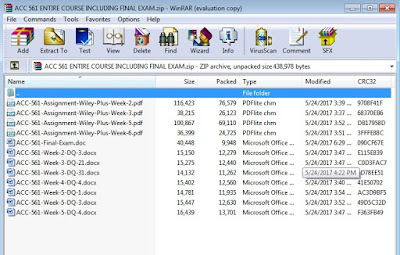Download Devry Busn 278 Midterm Answers : Click HERE
Points received : 180/190
1. Question : (TCO 1) The type of budget that is updated on a regular basis is known as a ________________
continuous budget.
revised budget.
updated budget.
flexible budget.
2. Question : (TCO 2) The quantitative forecasting method that uses actual sales from recent time periods to predict future sales assuming that the closest time period is a more accurate predictor of future sales is:
Moving average model
Weighted moving average model
Closest moving average model
Exponential smoothing model
(TCO 3) The regression statistic that measures how many standard errors the coefficient is from zero is the ________________
Student Answer: correlation coefficient.
coefficient of determination.
standard error of the estimate.
4. Question : (TCO 4) Capital expenditures are incurred for all of the following reasons except:
.
Instructor Explanation:
5. Question : (TCO 5) Which of the following is not true when ranking proposals using zero-base budgeting?
6. Question : (TCO 6) Which of the following ignores the time value of money?
Student Answer: Internal rate of return
Profitability index
Net present value
Payback period
7. Question : (TCO 1) There are several approaches that may be used to develop the budget. Managers typically prefer an approach known as participative budgeting. Discuss this form of budgeting and identify its advantages and disadvantages.
8. Question : (TCO 2) There are a variety of forecasting techniques that a company may use. Identify and discuss the three main quantitative approaches used for time series forecasting models.
9. Question : (TCO 2) The Federal Election Commission maintains data showing the voting age population, the number of registered voters, and the turnout for federal elections. The following table shows the national voter turnout as a percentage of the voting age population from 1972 to 1996 (The Wall Street Journal Almanac; 1998):
Voter Turnout
Year % Turnout Year % Turnout
1972 55 1986 36
1974 38 1988 50
1976 54 1990 37
1978 37 1992 55
1980 53 1994 39
1982 40 1996 49
1984 53
Part (a) Use exponential smoothing to forecast this time series. Consider smoothing constants of a = 0.1 and 0.2. What is the forecast of the percentage of turnout in 1998?
Part (b) Use the mean absolute deviation (MAD) to determine which smoothing constant provides the best forecast of voter turnout.
10. Question : (TCO 3) Use the table “Food and Beverage Sales for Paul’s Pizzeria” to answer the questions below.
Food and Beverage Sales for Paul’s Pizzeria Restaurant
($000s)
Month First Year Second Year
January 55 60
February 53 54
March 53 56
April 63 44
May 64 44
June 54 34
July 33 36
August 35 37
September 25 28
October 30 30
November 35 38
December 54 52
Part (a) Calculate the regression line and forecast sales for March of Year 3.
Part (b) Calculate the seasonal forecast of sales for March of Year 3.
Part (c) Which forecast do you think is most accurate and why?
Instructor Explanation:
11. Question : (TCO 6) Jackson Company is considering two capital investment proposals. Estimates regarding each project are provided below:
Project Nuts Project Bolts
Initial Investment $175,000 $100,000
Annual Net Income $30,000 52,000
Annual Cash Inflow $70,000 $45,000
Salvage Value $0 $0
Estimated Useful Life 3 years 3 years
The company requires a 9% rate of return on all new investments.
Part (a) Calculate the payback period for each project.
Part (b) Calculate the net present value for each project.
Part (c) Which project should Jackson Company accept and why?
12. Question : (TCO 6) Top Growth Farms, a farming cooperative, is considering purchasing a tractor for $468,000. The machine has a 10-year life and an estimated salvage value of $32,000. Top Growth uses straight-line depreciation. Top Growth estimates that the annual cash flow will be $78,000. The required rate of return is 9%.
Part (a) Calculate the payback period.
Part (b) Calculate the net present value.
Part (c) Calculate the accounting rate of return.
|


